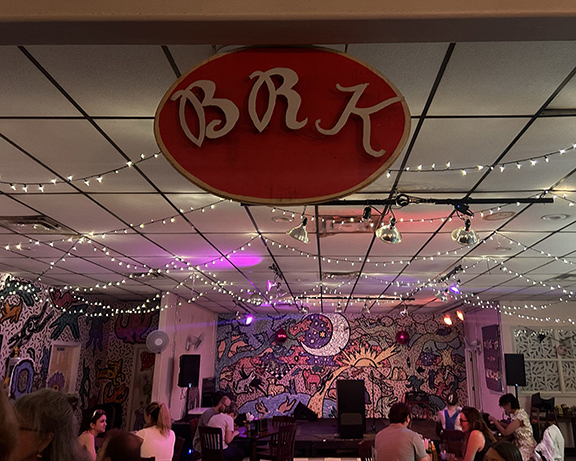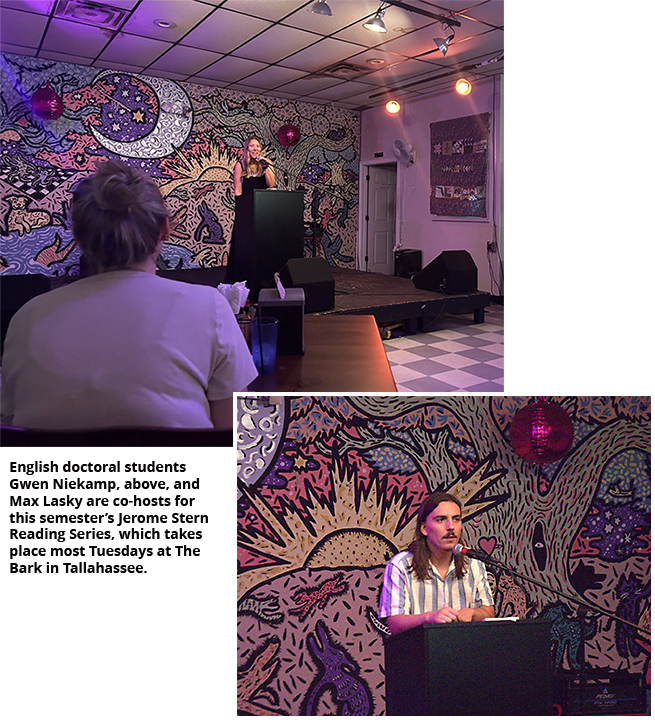Poetry, prose, and people—Max Lasky and Gwen Niekamp promote community while amplifying FSU's creative voices
By Christian Ojeda
Since the late 1990s, the Jerome Stern Reading Series has given the Tallahassee writing community a place to share and listen to new work produced by Florida State University’s English department’s graduate students, faculty members, alumni, and friends.
 Each academic semester, the campus and Tallahassee’s literary community gather weekly at The Bark, a restaurant and arts space located close to the Railroad Square District. The series is named after the late Jerome “Jerry” Stern, who was an FSU English professor and the director of FSU’s Creative Writing Program for nearly 30 years.
Each academic semester, the campus and Tallahassee’s literary community gather weekly at The Bark, a restaurant and arts space located close to the Railroad Square District. The series is named after the late Jerome “Jerry” Stern, who was an FSU English professor and the director of FSU’s Creative Writing Program for nearly 30 years.
Although the primary purpose of the series is to allow upcoming and seasoned writers a place to share their most recent compositions through weekly readings, another significant benefit is the series’ ability to create moments of connection and exchange between those writers and literary enthusiasts.
FSU English doctoral students Max Lasky and Gwen Niekamp are this year’s co-hosts for the series, and they both say that the latter ideal drew them to take the reins and produce these stimulating evenings. Lasky sees the job as his way of lending a hand while being able to make meaningful personal and professional connections.
“It’s an opportunity to meet the writers, and it's just nice to give back to the community,” Lasky says. “I feel like this community has given me so much that through this opportunity, I can give back to the writers and readers of Tallahassee."
English Professor Skip Horack recruited Lasky for the position, and Lasky asked Niekamp to join him because of their shared love for the series and the special place it holds as a Tallahassee cultural institution. For both graduate students, the urge to give back to the Creative Writing Program led them to take on the responsibility despite their busy schedules.
To find readers for the series, usually two for each event, Lasky and Niekamp reach out to graduate students who have recently published or soon-to-be published literary works. They also invite FSU alumni and writers from around the country.
Lasky and Niekamp introduce either the reader or someone the reader has chosen for the introduction. Each participant has 20 minutes to read. Lasky’s and Niekamp’s emphasis on service gives the duo a synergetic identity.
In addition to co-hosting the series, Niekamp takes on a mentorship role as the graduate student advisor for the English Honor Society at FSU, the department’s Rho Epsilon chapter of Sigma Tau Delta. She also teaches several undergraduate classes for the department, and says she is drawn to positions where she can build up others.
“I look for ways academia manifests itself outside of the classroom,” she says.
Like most academics, Niekamp has her own set of personal goals, but she has chosen to dedicate her time to ambitions that align with her community goals as well. Because of that importance she puts on building connections, she was delighted that Lasky asked her to join him as a co-organizer for this year’s reading season.
Welcoming the opportunity as a learning experience, Niekamp hopes the experience will help to improve her public speaking abilities. She is writing a memoir but has yet to read her own work at The Bark. "I have some stage fright,” she says, “but it doesn't manifest when I’m teaching or when I'm building someone else up. That feels different to me."
 Niekamp and Lasky each explore different genres of writing in their graduate studies, with Niekamp's concentration on nonfiction and Lasky’s compositional focus on poetry. Their diversity of work mirrors what an audience member can hear on a Tuesday night at The Bark.
Niekamp and Lasky each explore different genres of writing in their graduate studies, with Niekamp's concentration on nonfiction and Lasky’s compositional focus on poetry. Their diversity of work mirrors what an audience member can hear on a Tuesday night at The Bark.
On the night of a reading, visitors can expect a warm greeting from Lasky and Niekamp as they prepare the crowd for the featured readers. A typical reading usually consists of two speakers who share separate works that generally fall into the categories of poetry, fiction, or nonfiction. Encouraging people to attend, Lasky pitches how engaging this meeting of the minds can be.
“You're going to be surrounded by many like-minded individuals,” he says. “If you like literature, if you like reading, if you like writing, it's maybe one of the best places for you to be in Tallahassee.”
The camaraderie and fellowship exhibited each week is not exclusive to Lasky and Niekamp nor even the Jerome Stern Reading Series; those qualities reflect the Creative Writing Program as a whole.
"We are a bit scrappy and always ready to back each other up," Niekamp says with a smile.
This year's season boasts a highly accomplished cast of visiting authors, including FSU English department alumnus Kaveh Akbar, who earned his doctorate in 2018 with a focus in Creative Writing. Akbar received a Guggenheim Fellowship in April 2024, three months after the publication of his debut novel Martyr!, which is a New York Times bestseller book and listed on Barack Obama’s Summer 2024 Reading List.
“It's exciting; the reading series has had a consistent quality,” Lasky boasts. “I know it’s going to be an incredible year.”
The series kicked off on Tuesday, Sept. 3, with Robert O. Lawton Distinguished Professor of English and award-winning poet David Kirby reading from his recently published poetry compilation, The Winter Dance Party: Poems, 1983–2023. Colleagues piled in at The Bark to listen to him, and together, beneath string lights and among good company, they listened intently between stanzas and laughed at his well-placed comedic quips.
For Lasky and Niekamp, the evening’s pleasant atmosphere is what the Jerome Stern Reading Series should be about.
Christian Ojeda is an English-Editing, Writing, and Media major, with a minor in hospitality.
Follow the English department on Instagram; on Facebook; and on X.
